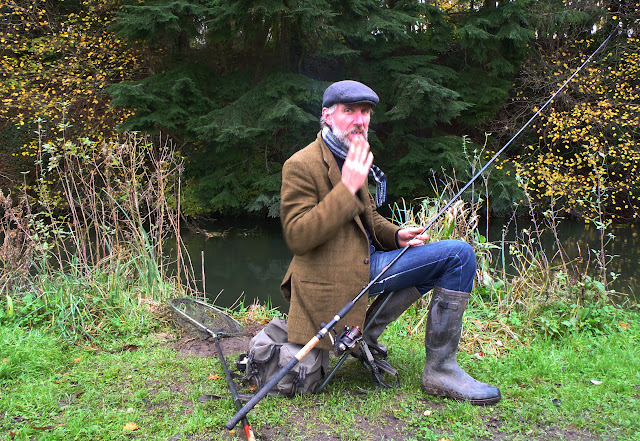I'm on sure footed terms with the Lower Itchen Fishery now that I've completed my sixth trip. I'd call myself 'in training' till my tenth, but I'm not bemused by it these days. The sheer quantity of stock swimming there is no longer surprising. It is now a problem to solve. A brick wall in front of the worthwhile things it promises — the 3lb grayling and the 3lb roach. Neither of which are impossible, but made all the more difficult to approach because of daunting number.
I'm seeing it for what it really is. Purely and simply — it's a 'commercial'.
 |
| Inside the fort... |
That is never more apparent when you've spent a couple of long hard days fishing the free stretch below Gaters Mill as I enoyed in the expert company of local rod, Simon Daley, back in 2012. That is a true coarse fishery with occasional wild migratory game fish to make things an interesting challenge. Most migrants that fall are taken away for the pot, as you'd expect. They do not dominate proceedings and grayling are uncommon therefore roach fishing, though not easy, is a simple matter of building a swim throughout the day by accurate, constant, regularly timed feeding of what amounts to an enormous amount of bait over the session and hopefully reaping the rewards of patience. It is not a party certain to be spoiled by gatecrashers. And when they come along then it's usually chub often of some size...
I've seen it done well and thirty pounds of roach fill a net. I've done it myself inexpertly, and though I struggled to do well, I still put together ten pounds fairly easily with a good few pound-plus fish to make things feel upwardly bound. Roach there are not the elusive ghost they are upstream. They are the backbone of the population.
Things above the mill are something else entirely. Heavy feeding there just cannot work. As with any commercial fishery stuffed bank to bank with millions of fish of all shapes and sizes, overdoing that attracts entirely the wrong crowd and reduces the chances of selecting the best from it. Roach are not party animals. They will back off...
 |
| James Denison trotting the free stretch early morning |
I think that James and Brian may have enjoyed themselves more if they'd stayed 'free' because I don't think they were entirely happy with what was in store. It is a tough prospect. Commercials are that if it's specimen fish you are after. If they are there to catch then it means thinking through the problems they present very carefully and coming up with a plan.
I thought I had one...
I'd never crossed over the footbridge to explore one of the carrier streams till today. The difference with the main river was something of a shock. Ambling through dairy pasture a convoluted gentle-paced watercourse lined with trees meets a gushing boiling torrent of sparkling clear water tearing across shimmering chalk gravel. Its character is absolutely nothing like that of the main river and not at all like a chalk stream either. At their confluence they were chalk and cheese.

It felt familiar. Like a Warwickshire brook. In contrast to the main river where hopefully a a pluck or more likely a wrench will come to bread often within seconds of casting out, I was struck by the lack of immediate bites. Had to work hard at finding them just as I would have to when fishing my local River Sowe. It was too placid for the paternoster feeder rig I'd tied up for the main river. Free-lining by stealth might have scored. As with the Sowe where I always free-line bread, anything more than a single shot splashing down here was clearly too much of a disturbance for my target species.
But I really didn't expect to catch them anyhow. This was just a dabble. To ascertain depths and features and future potential. And besides, the day had dawned bright and clear and the only real chance of roach would come around dusk. Between times I was going to work hard for a good grayling but I stuck it out in the carrier for a good while longer and was rewarded with a few tippity taps here and there and a one pound chub. I'm sure on a future trip on an overcast day or even better, one shrouded in thick mist, that time spent creeping about and staying low might well throw up a surprise or two. Because it really did look to be prime small stream roach territory.
When I left the carrier behind and crossed back over the bridge I went out on a nearby jetty and dropped bread into angrier waters. The tip wrenched around violently and after a bit of a tussle, in came the first of what I expected to encounter from time to time throughout the rest of the day — the Itchen Standard Brownie.
What I didn't expect was that from the end of that jetty I'd haul ten in the next hour!
This swim was alive with them. The best at around the three-pound mark gave me no end of trouble tearing about in lunatic fashion but the smallest at a pound and a half and all the rest between were no different. I was hoping for one of the big cocks with their lurid plumage and outlandish kypes who'll spend half the fight up in the air. A battle like that is something else. But they occupy pools so it seemed I'd not have that here...
It was great sport but it paled quickly being far too easy. Nevertheless there was a bonus grayling at 1lb 6oz between them all so I had my fill of trouty fun and earned myself 36 challenge points too.

Mick was having a great time trotting maggots and then corn taking grayling of ever increasing size and enjoying the once-only thrill of beating a personal best over and over again in the same day. Because before his first cast when I assured him he certainly might (and actually did!), he'd never caught one before. Mid afternoon he hit the ceiling at 1lb 8oz...
It's a challenge to do better than that...
 |
| Mick Newey. Banking a new PB most likely! |
The rest of my morning was spent in pursuit of one of those dusky three-pound grayling. They are possible. But most unlikely amongst so many competing greedy mouths. Here and there, there's places that really feel as if the big fish might come. Quieter. Deeper. Smoother. Fewer.
 |
| The fastest water and the shallowest too. Brimming with small grayling |
Feeder fishing is good for that. Explaining precisely how seemingly rapid swims up top can be placid and even-paced down low. But when I finally did find a place where I felt that an hour more might just produce that dream, the entire rig including the feeder and the good grayling it'd hooked, was devoured by a pike.
Brian tried for the gatecrasher with a float fished dead roach while James tried to tempt grayling rising in hoards to his free offerings of red maggots.
 |
| Jeff Hatt and Brian Roberts watch James Denison not catch grayling easily |
Interesting that he found it very hard to hook them. They were absolutely determined to mop every last one up but were ignoring the baited hook fished mid water. Very cute. And something of a lesson in how to avoid grayling and catch roach because it was clear that grayling are either not great mid-water specialists or are very good at spotting a baited hook.
Which suggested a question I'd never considered before.
A shame it was a question that didn't occur to me right there and then...
 |
| Ooh... Should I camp out for roach, or just go camp? |
It was high time to go all out for roach but should I ignore them today and just keep going at grayling? This was a tough call. I didn't think it was a good day for roach to be honest. The weather had been highly unsettled and extremely changeable the last few days, had been bright all morning, but would turn again by evening with thick cloud and high winds approaching fast.
Against my better judgement I made what I feared would be the wrong decision.
So I made my way downstream to the slow flowing lower beats and on the way thought about setting up a rod for the job of trotting caster. But I couldn't decide if this was a ledgering bread kind of day or the trotting caster kind. So I set up both.
Well, I plumped for trotting. Feeding hemp and caster regularly and lightly I began fishing well under depth. Bites were not forthcoming. But inching the float up by degree and lowering the bait through the bite-less zone till I was fishing near bottom at around 7 or 8 feet down, then they suddenly arrived. They were from grayling and minnow. And as the feed increased in effect the grayling increased in size and the minnows vanished. But they were still grayling. Not roach.
A trout was next. A very tricky and determine trout. But roach were not going to come along unless by sheer luck because time was running down, the weather had turned for the worse, and I really should have started trotting far earlier in order to feed off the small fish. However, it was the same story for all. They could not be caught on the float. Unusually, around dusk not a single ripple caused by roach was seen anywhere by anyone. It was as if they did not exist.
Packing down when I couldn't see the float I went down and joined Mick fishing out the last light in the windy weir pool. He'd had two small roach there on ledgered maggots. I mentioned that it was very unusual that apart from the pounder I'd caught in the carrier, nobody had found the larger chub that had always shown in the latter part of the day on all my previous trips.
His tip bangs hard over as I speak and in comes a four pounder!
And that was that. Completing my stillwater-river-canal 2lb roach hatrick in the same season was never going to be anything less than 1% of the possible, but it's going to be 99% impossible to find the river roach from my midland venues. One best chance of securing the two up advantage had passed me by and right now I can't think of another but that of working tremendously hard and striking very lucky at Stratford upon Avon town waters, or, arranging a train ride back down to Southampton and cracking the free stretch of the Itchen.
Nevertheless, it was a very enjoyable day spent with great company. I learned much for the future and have a carrier to explore by stealth next time around.
But...
Only on the way home did the question — that if answered earlier might have changed my fortunes — finally arrive in my thick head.
'What if I forego easily won bites and fish the apparently dead zone above the grayling's reach'?
Not an easy thing for a self-confessed biteaholic to contemplate...




























